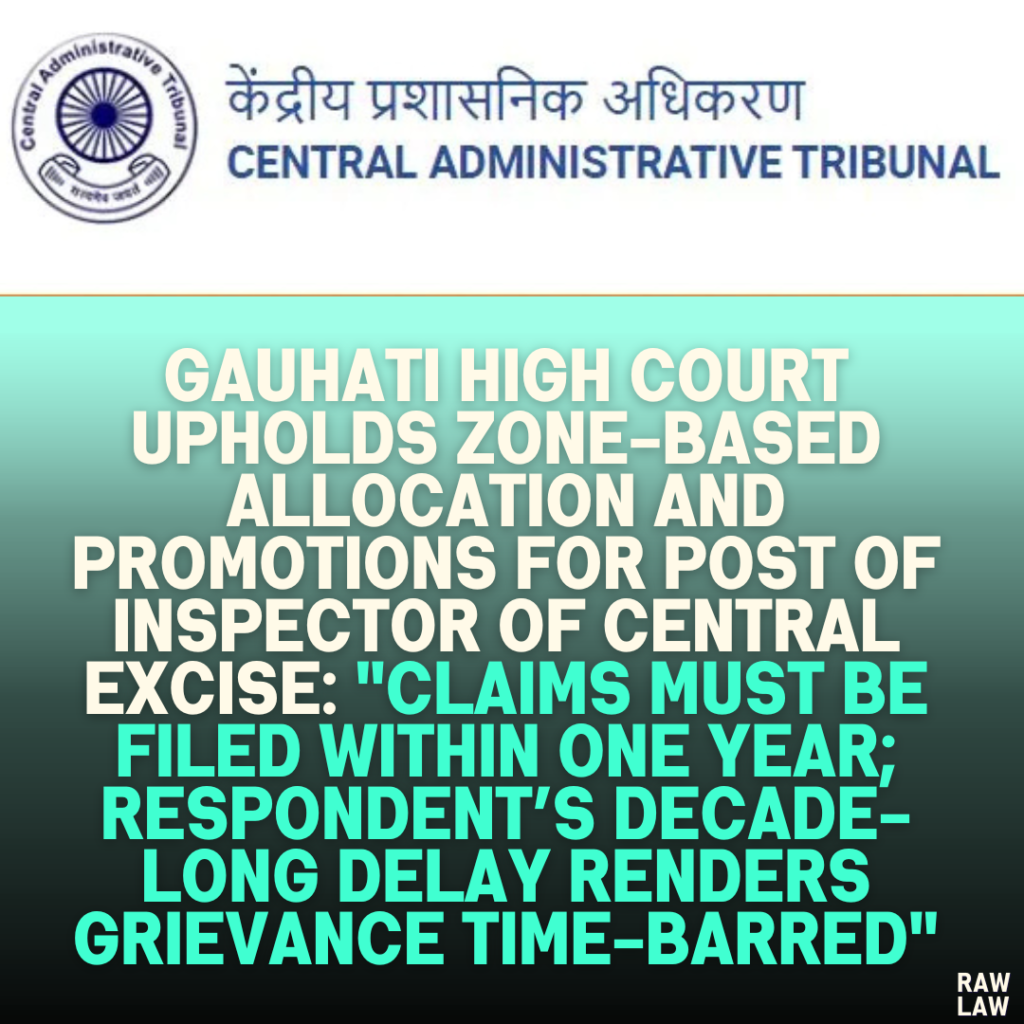Court’s Decision:
The Gauhati High Court allowed the writ petition filed by the Union of India and others, setting aside the Central Administrative Tribunal’s (CAT) directive for revisiting promotion processes and reviewing the respondent’s case. The court held that:
- Zone-wise allocation of posts, based on domicile and vacancies, was consistent with recruitment rules and did not require All-India merit as the sole criterion.
- The respondent’s claim regarding wrongful zone allocation and promotions was time-barred under the Administrative Tribunals Act.
- The tribunal’s directions for policy changes were legally unsustainable without substantive grounds.
Facts:
- Background of Recruitment:
- The respondent participated in the recruitment process for the post of Inspector of Central Excise in 1996, which was conducted on a zonal basis.
- Following the Supreme Court’s decision in Radhey Shyam Singh & Ors. v. Union of India, zone-wise selections were struck down as unconstitutional. A re-examination was held in 1999, followed by interviews, and results were declared in 2002.
- Zone Allocation:
- Based on domicile and vacancies, the respondent was allocated to the Shillong Zone in 2004 and joined the post.
- Grievance over Promotions:
- In 2014, the respondent noticed that his junior, promoted in the Vadodara Zone, had surpassed him. He claimed that this occurred due to arbitrary zone allocation, which denied him promotions available in zones with higher vacancies.
- Tribunal’s Decision:
- In 2020, the CAT directed a review Departmental Promotion Committee (DPC) to consider the respondent’s promotion, a streamlining of promotion rules, and potential policy revisions.
Issues:
- Was the allocation of the Shillong Zone to the respondent arbitrary or discriminatory?
- Did the promotion process violate Articles 14 and 16 of the Constitution by failing to consider All-India merit for promotions?
- Was the respondent’s challenge time-barred under the Administrative Tribunals Act?
- Were the CAT’s directives for policy review within its jurisdiction?
Petitioner’s Arguments (Union of India):
- Zone-Based Allocation Is Lawful:
- Allocation was based on domicile and vacancies in compliance with the Central Excise Recruitment Rules, 2002, which created independent cadres for each zone.
- Rule 4(1) explicitly states that each Commissionerate has its own cadre unless otherwise directed.
- Promotions Are Zonal:
- Promotions are based on zonal seniority rather than All-India seniority.
- Within the Shillong Zone, no junior to the respondent had been promoted.
- Delay in Filing Grievance:
- The respondent waited a decade (from 2004 to 2014) to raise concerns about zone allocation and promotion, rendering the claim time-barred under Section 21(1)(a) of the Administrative Tribunals Act, 1985.
- Tribunal’s Directions Lack Basis:
- The CAT’s direction to streamline promotion rules and policies was without merit, as the respondent’s grievance was specific to his case.
Respondent’s Arguments:
- Violation of Constitutional Principles:
- Allocation based solely on domicile and vacancies, without considering All-India merit, discriminated against candidates with higher ranks.
- This violated Articles 14 and 16 of the Constitution.
- Supreme Court’s Ruling in Radhey Shyam Singh:
- Zone-based selection had already been declared unconstitutional, making zone-based allocation inherently flawed.
- Unfair Promotion Practices:
- The respondent’s juniors in other zones were promoted, causing inequity.
- Delayed Filing Justification:
- The respondent only realized the discriminatory impact of the allocation when promotions were granted to juniors.
Analysis of the Law:
- Rule 4(1) of Recruitment Rules:
- The recruitment rules establish independent zonal cadres. Zone allocation based on domicile and vacancies aligns with this framework.
- The respondent failed to challenge this provision, which remained valid and binding.
- Supreme Court’s Decision in Radhey Shyam Singh:
- While the Supreme Court struck down zonal recruitment as unconstitutional, it did not mandate zone allocation based solely on All-India merit. Promotions within zones are separate from recruitment principles.
- Statutory Limitation Period:
- Section 21 of the Administrative Tribunals Act requires claims to be filed within one year of the cause of action. The respondent’s decade-long delay rendered his grievance time-barred.
- Merit-Based Promotion Not Mandated:
- Promotions are governed by zonal seniority and vacancy-based criteria, not All-India merit.
Precedent Analysis:
- Radhey Shyam Singh Case:
- The Supreme Court invalidated zonal recruitment but left allocation and promotion criteria to administrative discretion.
- Administrative Tribunals Act, 1985:
- Delayed claims are inadmissible unless justified by sufficient cause.
Court’s Reasoning:
- Delay in Raising the Claim:
- The respondent accepted his zone allocation in 2004 without protest. His grievance in 2014 was too late and lacked justification.
- Allocation as per Rules:
- The Shillong Zone allocation was lawful and based on domicile and vacancies, consistent with the rules.
- Promotion Standards:
- No junior to the respondent was promoted within the Shillong Zone, nullifying claims of unfair treatment.
- CAT’s Overreach:
- The tribunal’s directive for policy changes exceeded its jurisdiction, as the grievance was individual and not a systemic issue.
Conclusion:
The High Court quashed the CAT’s directives, holding that:
- The zone allocation and promotion processes were lawful.
- The respondent’s challenge was time-barred.
- The tribunal lacked grounds to order policy changes.
Implications:
- Reaffirms Zonal Seniority:
- Promotions remain governed by zonal seniority unless successfully challenged.
- Statutory Timelines:
- Ensures strict adherence to the limitation period under the Administrative Tribunals Act.
- Scope of Tribunal’s Authority:
- Limits tribunals from intervening in administrative policy without clear evidence of systemic flaws.




Pingback: Himachal Pradesh High Court Rules on Medical Reimbursement Claims: ''Insufficiency of Funds Cannot Deny Entitlement''; Directs Payment with Interest for Non-Compliance - Raw Law